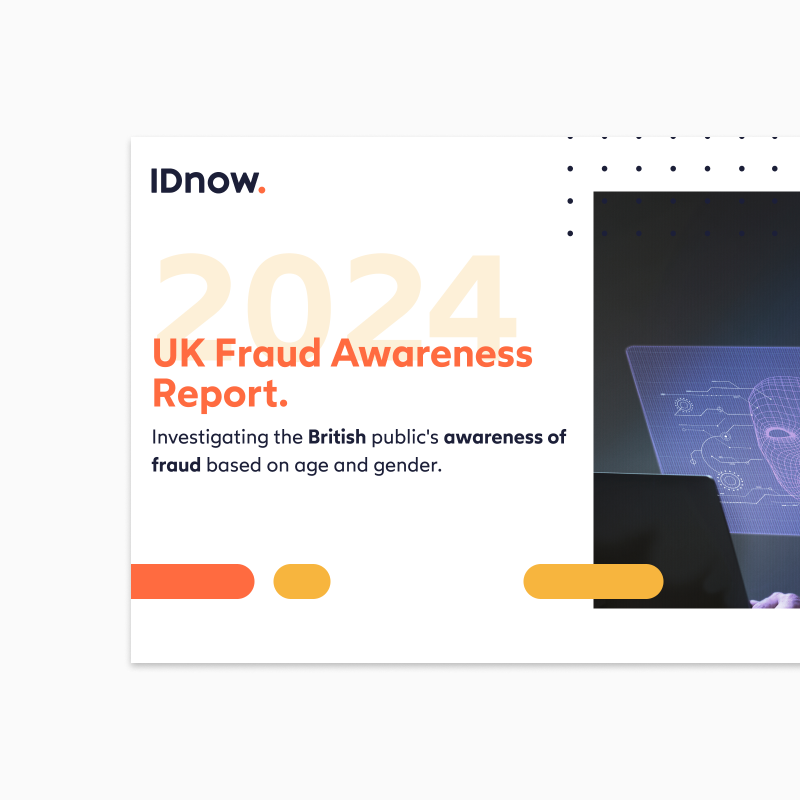IDnow’s recently released UK Fraud Awareness Report explores the nation’s awareness of the latest fraud terms, the industries most susceptible to fraud, and how commonly Brits use risky channels.
2023 proved to be a monumental year for fraud in the UK. In fact, by the middle of the year, the losses attributed to fraud were already £580 million.
The year was also important for the steps that the UK government pledged to take to address fraud. Chief among these was the release of its fraud strategy, which, the government hopes, will reduce fraud by 10% by 2025. The Online Fraud Charter was also launched in 2023, which is a voluntary agreement between the government and technology sector to reduce fraud on their platforms and services.
While these initiatives will hopefully go some way to encourage the public and private sector to tackle the scourge of fraud in the UK, they will not necessarily address perhaps the most important challenge: educating the public in a tangible, meaningful way.
With the aim of investigating the British public’s awareness of fraud and its attitudes toward fraud prevention technology, we created the inaugural IDnow UK Fraud Awareness Report.
Discover the differences in public perception of fraud and identity verification in France and the UK in our blog, ‘France vs UK. Which country knows more about fraud?’
UK Fraud Awareness Report 2024

In the first of a three-part blog series, we explore the fraud education levels of the British population, the areas of life most susceptible to fraud, and users’ behavior around insecure digital communication channels.
Assessing the awareness of fraud.
If there was one term that appeared to be on everybody’s lips (from the fraud prevention community) last year, it was ‘deepfakes.’ However, despite some widely circulated deepfake videos of famous politicians making headlines in 2023, we discovered that almost half (47%) of Brits said that they do not know what deepfakes are.
We define deepfakes as deceptively lifelike, manipulated images, audio or video recordings. The quality of deepfakes is constantly improving as computing power increases and AI advances, making it increasingly difficult to distinguish between authentic and artificially created or altered material.
Social engineering, unlike other forms of cyberattacks, appeals to human vulnerabilities and emotions. For example, in romance fraud, the fraudster uses social engineering to build up a rapport with the victim with the intention of tricking them into registering for a service or transferring funds. Worryingly, we discovered that more than half of Brits (54%) do not know what social engineering is.
However, we did discover some positives regarding the British public’s awareness of fraud terms. A vast majority (83%) of respondents say they know what ‘phishing’ is (gathering a victim’s personal information, such as credentials or payment information, by getting them to click on a malicious link or attachment).
Although many respondents were not aware of the definitions of the latest forms of fraud, an overwhelming number (93%) say they are concerned about fraud in one way or another.
Which industry is most susceptible to fraud?
Despite a majority (73%) of Brits believing their bank is effective in safeguarding their financial assets, three quarters (75%) of respondents said banking was the industry they were most concerned about when it comes to fraud. More than half (55%) of UK adults say they are also concerned about online shopping fraud, followed by a third of the population (37%) citing social media fraud as a worry.
Respondents were also asked to assess the risk levels of different crimes: 32% think they are most at risk of someone having access to their bank account through identity fraud; another 21% of Brits think they are most at risk of someone hacking their social media profile.
Discover more about the different types of social media fraud, and how one man almost lost a million euros to a pig butchering scam in our blog, ‘The rise of social media fraud: How one man almost lost it all.’
Other industries are also perceived as rife with fraud. Around 2 in 10 Brits are concerned about insurance fraud (19%); 14% worry about fraud in cryptocurrency, eGovernment (13%), online dating (13%), travel (12%) and telecoms (11%).
[Discover the steps that one woman is taking to expose romance scams in our blog, ‘What’s love got to do with it? Exposing the romance scammers, with Becky Holmes.’]
Which channel is considered the riskiest?
Despite 97% of respondents knowing what identity theft means, and widespread concern about fraud in various areas of life, a third of Brits (33%) have admitted to sharing scans or photos of ID cards, driving licenses or passports via insecure and largely unencrypted channels, such as social media, email or messenger apps. Of these people, almost half (45%) said they were aware that these document scans or photos could land in the hands of fraudsters but proceeded to share these scans or photos anyway. This is a clear indicator that consumers are either unaware of an alternative way of verification (for example, via an identity verification solution) or the service they were trying to access did not offer a secure channel. It also highlights the importance for businesses to provide secure digital channels for customers to share personal information.
How IDnow helps prevent fraud.
IDnow offers comprehensive fraud prevention solutions to safeguard against various types of fraud, including social engineering, fake IDs, identity fraud, and much more. Our automated document verification and biometric checks, including selfie and face match, verify users’ identities with precision, while our passive liveness detection feature adds an extra layer of security, ensuring that genuine customers are verified seamlessly.
We also offer an expert-assisted video verification process, where trained professionals who verify users’ documents and ask security and fraud related questions looking for any signs of suspicious behavior or social engineering attempts. Through real-time intervention and questioning, our experts can detect and prevent fraudulent activities effectively.
IDnow also regularly runs education and awareness sessions to help clients and their customers recognize and respond to social engineering threats. By combining advanced technology, expert insights, and proactive strategies, IDnow is committed to helping businesses mitigate the risks associated with rising fraud attempts and protect both their reputation and their customers’ trust.
By

Jody Houton
Senior Content Manager at IDnow
Connect with Jody on LinkedIn



